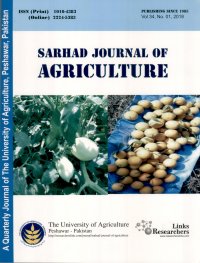Comparative Potential of Different Modified Biochar Sources on the Ionic Composition of Soil and Stress Mitigation in Maize under Saline-Sodic Conditions
Comparative Potential of Different Modified Biochar Sources on the Ionic Composition of Soil and Stress Mitigation in Maize under Saline-Sodic Conditions
Muhammad Umair1,2, Muhammad Naeem1, Asad Jamil3 and Muhammad Younas2,4*
ABSTRACT
Soil salinization is a global issue regarding decline in productivity of agricultural fields. It is the major abiotic factor behind loss of crop production in arid to semi-arid zones. High temperature and low rainfall lead to accumulation of salt on the soil surface. Moreover, the low organic matter status of soils further worsens the soil conditions. All these factors have severely reduced soil productivity. There is need for some sustainable management practices for rehabilitation of degraded soils in arid zones. Application of organic matter under these conditions can restore the soil productivity. So, use of biochar for soil restoration under these conditions can be an efficient approach due to its long-term stability in soil. Thus, a pot experiment was conducted using a completely randomized design to evaluate the effect of three different modified biochar on properties of saline-sodic soil and growth of maize. Rice husk biochar (RHB), wheat straw biochar (WSB) and orange peel biochar (OPB) were applied after washing with distilled water. Results showed that all treatments improved the soil chemical properties as compared to saline-sodic control. However, maximum decrease in soil ECe (37.63%) and soil pHs (22.61%) was found with application of rice husk biochar @ 0.3% as compared with saline-sodic control. Similarly, maximum decrease in soil Na+ (59.66%) and SAR (63.65%) was also observed in rice husk biochar @ 0.3% when compared with saline-sodic control. However, soil Ca2++Mg2+ was found maximum (39.82%) for rice husk biochar @ 0.15% as compared to saline-sodic control. Similarly, all treatments improved the maize growth as compared to saline-sodic control. rice husk biochar @ 0.3% showed maximum increase in plant height (51.82%). Similarly, maximum increase in shoot dry weight (160.24%), root dry biomass (169.52%), root length (15.87%), and chlorophyll contents (53.62%) was also found for rice husk biochar @ 0.3% as compared to saline-sodic control. rice husk biochar @ 0.3% was found most effective in improving maize growth and soil properties under saline-sodic conditions.
To share on other social networks, click on any share button. What are these?







